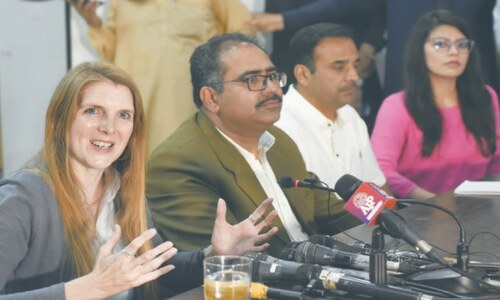ISLAMABAD: Speakers at a webinar on Friday said the government had not been able to give due attention to the constant rise in child labour whereas development partners had also not been able to curb the menace.
They identified the deficient and conflicting legislation on child labour and rights as the main hurdle.
The webinar was organised by Development Communications Network on the topic ‘Covid-19 and Child Labour: the nexus of poverty, population and food security’. The event was held to commemorate World Day Against Child Labour.
The panels of experts included United Nations International Labour Organisation (ILO) Country Director Ingrid Christensen, Senior Programme Officer Child Labour in Agriculture at the Food and Agriculture Organisation of the United Nations (FAO) in Rome (Italy) Ariane Genthon, Executive Director Parliamentary Commission for Human Rights Chaudhry Mohammad Shafiq, Sialkot Chamber of Commerce and Industry President Mohammad Ashraf Malik, Senior Programme Officer ILO Pakistan Saghir Bukhari, Pakistan Workers FederationGeneral Secretary Zahoor Ahmad Awan besides representatives from international and local NGOs and the private sector.
Ingrid Christensen warned that with Covid-19 spreading, over two million more children would be pushed into child labour in Pakistan. There is a strong link between child labour and socio-economic conditions, she added.
“To curb child labour we need to improve rural economy and working conditions of daily wagers and other marginalised communities that need long-term and sustainable partnerships between development partners and governments,” she said.
It was pointed out in the webinar that child labour survey was started last year in March with Unicef Pakistan taking the lead to access the situation on ground.
Ms Christensen however feared that due to the pandemic it might not be completed in time.
Ariane Genthon said: “We need more data on the involvement of children in harmful tasks in different sub-sectors of agriculture to help agricultural programmes and stakeholders take action.
“Covid-19 and the locust invasion will have detrimental effects on farmers. These will likely exacerbate the number of children in child labour. Agricultural stakeholders, including small-holders, can play a positive role in eliminating child labour in agriculture but we need to involve them.”
The participants observed that more than 71pc child labour is engaged in agriculture where poisonous pesticides are used that directly threatened health and lives of the children. “Unfortunately, increasing poverty and population force the farmers to engage their children in agricultural fields. FAO has launched an awareness campaign in selected districts of many developing countries to ensure that children are kept away from the fields. They can only be prevented from the fields if engaged in education or vocational skills after the farmers are subsidised for the inputs to the crops,” Ariane Genthon said.
Devcom-Pakistan Director Munir Ahmed said Pakistan was relying on three decades old data concerning child labour.
Published in Dawn, June 13th, 2020














































Dear visitor, the comments section is undergoing an overhaul and will return soon.